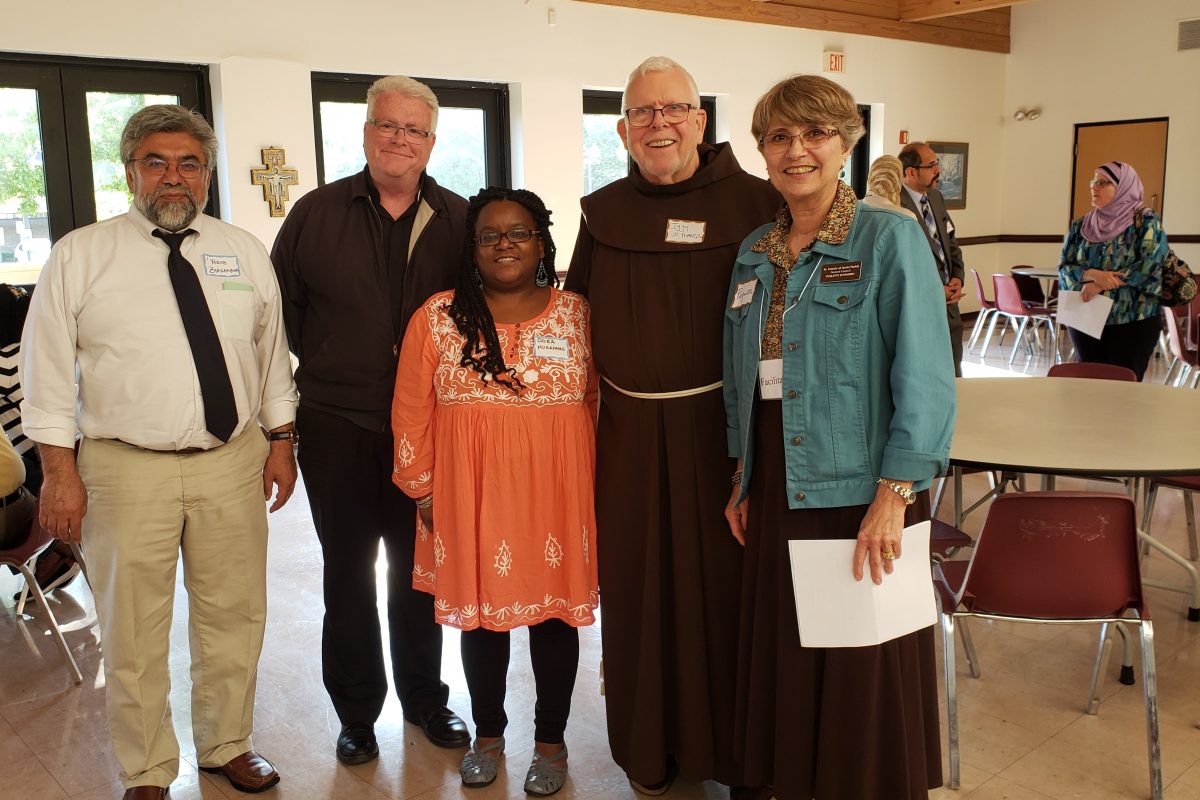
By Dora Muhammad, Health Equity Manager, Virginia Interfaith Center for Public Policy —
In today’s climate of escalating terrorist attacks against houses of worship while believers are gathered together in sacred prayer, the spirit of hate is seeking to snatch that holy vulnerability. We cannot allow fear to diminish the light that emanates from ecumenical unity and interfaith connections.
This Sunday, just a day after a gunman attacked a synagogue in CA, a church in VA went ahead with a planned interfaith gathering. I was blessed to be one of 60 people at a film screening and discussion co-sponsored by St. Francis of Assisi Catholic Church and the Dar Al-Noor Mosque. Christians and Muslims sat together to screen the docudrama, “The Sultan and the Saint” in the church fellowship hall. Hosted by its interfaith ministry, the event was informative, inspiring, and unifying.
The 2016 PBS film recounts the story of the life of the cherished founder of the Franciscan Order of Catholics, St. Francis of Assisi. How did Francis, a renegade young man from a small town in Italy become venerated as a saint? And what motivated him to try to engage with a Muslim leader during the bloody Crusades?
Francis’ spiritual awakening began during a walk in the woods when he was approached by a group of lepers. During the Middle Ages, lepers carried bells or clappers – a practical device often used as a signal to make people aware of their presence (most could not speak because the disease damaged their larynxes). But the ringing bells served to further isolate lepers from society, causing people to run in the opposite direction in fear of contracting the incurable disease. However, Francis did not run away. Instead, he turned toward the lepers and is said to have embraced them in the woods.
This moment marked the beginning of Francis’ journey of compassion and outreach. Years later, when he was a priest, Francis requested a face-to-face meeting with Malik al-Kamil, the fourth Sultan to rule over the Egyptian empire, during the Fifth Crusade in 1219. Francis went against the Pope by seeking peace with the enemy rather than lifting his sword in obedience to the Pope’s call to join the church-ordered murderous Crusades. The bitter, bloody Fifth Crusade was launched by the church to regain control over the Holy Land from Muslim rule. While the Crusades ultimately failed, they deepened religious schisms and stoked hatred towards Muslims, Jews and Christians that still persists today.
Francis’ dialogue with the Sultan, his interaction with Muslim soldiers, and experiences watching them in continual prayer sparked him to amend his order’s “constitution.” Francis’ new constitution included daily prayers. And his beautiful prayer, “The Praises of God” exalts God with descriptors identical to the 99 Attributes (Names) of God in Islam. This interfaith encounter also motivated the Sultan, despite gaining the upper hand in the battle, to deliver daily bread and nourishment to the starving, isolated Catholic soldiers instead of slaughtering them at their weakest point.
Christians and Jews have just concluded the holy season of Easter and Passover. May 6th will usher in the sacred period of Ramadan for Muslims. May 2nd is the National Day of Prayer in the U.S. This observance should beckon all faiths to move beyond their own prayer rituals and turn towards other faiths with a loving purpose. Like St. Francis, who embraced the lepers when he heard their ringing bells in the woods, we should embrace each other. When we open ourselves in this way, we move beyond “tolerance” of the other – to find brothers and sisters to embrace.
“O mankind, indeed we have created you from male and female and made you peoples and tribes that you may know one another.” – Qur’an Surah 49:13
Photo: (L-R) Dar Al-Noor Chairman of the Board Yaqub Zargarpur, Catholic Diocese of Arlington Office for Ecumenical and Interreligious Affairs Director Fr. Donald Rooney, VICPP Health Equity Manager Dora Muhammad, St. Francis of Assisi Hispanic Ministry Lead Fr. Ignatius Harding, and Cursillo (Interfaith) Ministry Lead Pequitte Schwerin.
